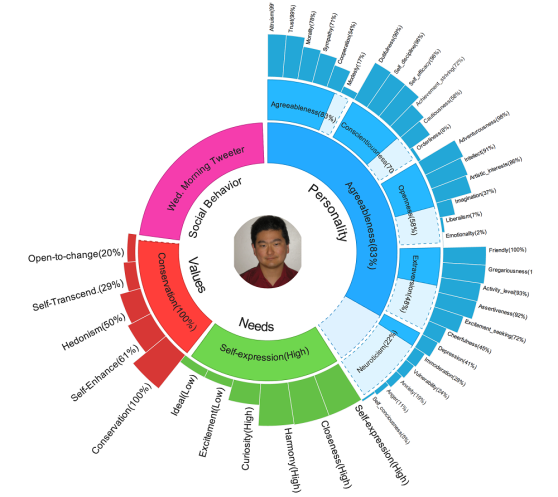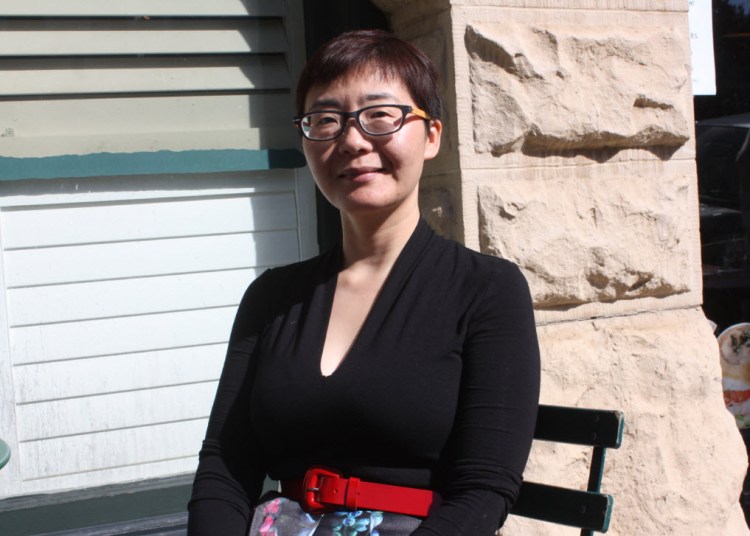VentureBeat: I was going to ask about that. I share our stories on Twitter, mostly. That’s the main function of what I do there. Every now and then, I have an opinion I throw out there. Is it more valuable for you to search for my opinion, instead of every single story that I’m sharing?
Zhou: I see. That’s a good point. In your profession, that’s unique. In our case studies, we’re looking at word usage, unless—When you write a story, you probably intentionally mask your normal usage of words.
 VB: And then half the time we’re just spouting off our opinions. There’s that mixture of blogger and journalist.
VB: And then half the time we’re just spouting off our opinions. There’s that mixture of blogger and journalist.
Zhou: An interesting experiment to do with someone like you would be to separate your professional and personal writing and see whether those profiles are similar. We haven’t done that particular study yet. But what we’ve done is, we use a Twitter ID, and we also have an internal social media platform called IBM Connections. Those two profiles are similar. One is all about work, but it’s informal. It’s not like a paper I’d publish in a journal.
So here’s what we got from those 200 tweets of yours. You can tell us what’s accurate and what’s not. I should explain this a bit. The Big Five personality traits are sometimes called the OCEAN personality profile. O represents your Openness to experience. C represents Conscientiousness. You’re very dutiful, it seems. That’s very high. E is Extroversion versus introversion. You came up an introvert. A as Agreeableness. You also have a high level of agreeableness. N is Neuroticism, emotional stability. You’re a bit below average on this one.
These here are fundamental needs, based on work by Maslow in 1943. Currently we’ve identified about six needs. First, self-expression. Then, closeness, how much you value your relationship with family and friends. Then, harmony – whether you want to be in confrontational situations, or if you’d rather everybody gets along. Curiosity, how curious you are about new things. Idealism – are you a perfectionist? Do you want everything done in a very precise, perfect way? Excitement – do you go out and seek exciting things?
On the other side are what we call human basic values. These measure a person’s beliefs and motivators, what drives people. Conservation means you value tradition. Another is self-enhancement, a desire to develop and improve yourself. Fatalism involves seeking pleasure. Self-transcendence means working for the good of the world, a high level of altruism. Open to change means that you seek out different things to try. So you’ll have to tell us how accurate this is.
When we try to figure this out going by a person’s tweets, it’s simply by the histogram. There’s no numerical analysis. These things were derived from your 200 tweets, or maybe a few more, since you have about 18,000 altogether.

Above: Dean Takahashi’s Twitter personality
VentureBeat: Did you say something about depression?
Zhou: Self-expression, you mean. [laughs] It means you’re assertive, that you tend to build your own brand with the words you use. You maintain a self-identity. It seems like you’d do that in your work as a reporter. Closeness means you value family and close friends.
This analysis came together in about 20 seconds. If someone has only, say, 60 tweets, we can use the same analysis, but we know it won’t be accurate.
VentureBeat: Would something like Facebook be more useful, because people aren’t so limited by the number of characters?
Zhou: Like I said, we’re also doing this with IBM Connection, the internal enterprise social platform. That has longer blocks of text. We haven’t found any really huge differences when we examine people who use both that and Twitter. Even though Twitter messages have a lower number of characters, the words people use are consistent, so they’re a good indicator. We’ve run studies where people take psychometric tests, a 26-item or 52-item test, and compared the results to our Twitter-derived scores. We’ve found that they’re highly correlated. Not for 100 percent of people, certainly, but around 80 percent of the people in our test population.
Also, the way a lot of people use Facebook, they may not output very many words. They’ll like other posts and post pictures, but that’s it. We need 2,500 or 3,000 words.
VentureBeat: What about the idea that somebody might be using their Twitter to play some kind of role, or project a different personality for people to see?
Zhou: Yeah. In that case, we wouldn’t know. Another good example, yesterday I ran a profile for a customer of ours on a CEO of a company in Asia. I knew him very well, the CEO, and I said, ‘Listen, I want to warn you. He has about 20,000 tweets. Are you sure he wrote all of these? He might have a publicity staff doing it for him. You might want to take these with a grain of salt.’ Same with a celebrity, like Kobe Bryant. Someone like that may be trying to establish a certain type of image. With our technology, we can go by what they say. You might even see something like that with the President, depending on different presidential speechwriters.
It’s interesting. With a company like this one, people sometimes have a negative feeling about this work at first – ‘Oh my God, these people know so much about me.’ We want to avoid that. When we ask people to look at their own portraits, we actually tend to get very positive feedback. People say things like, ‘I really discovered another side of me, something I didn’t think I have.’ One person said, ‘I didn’t realize I was so open on this scale.’ Another said, ‘I want my colleagues and my management to understand who I am and appreciate me, to give me assignments that fit me the best.’ Others have said that they can use it to see where they can improve themselves in certain ways.
Of course, you can’t always avoid a certain amount of manipulation. People are people.

Above: Waiting room
VentureBeat: It’s interesting to consider why some people why some people would want to know the personality of another businessperson they’re dealing with. A negotiator would love this stuff. Are there some other business purposes that make this a good thing to know about people?
Zhou: I was talking to hospitals in San Francisco. For patients with, for example, diabetes and weight problems, the number of people who adhere to a wellness program, or even treatment, is very low. It can be around 30 percent. Hospitals and health care providers really want to be able to engage their customers to make sure they stay on their wellness program. It’s good for the patient and good for the business.
If they found someone who couldn’t stick to the wellness program because they’re not very organized, because they always forget things, they could intervene to deal with that specific problem. If you know that a person values family and friends, you can leverage that – “Do this with your family members together so you can stay fit and spend time with them.” Once you know someone’s motivations, you know how you can encourage them – or at least that’s the hypothesis that we wanted to test out.

